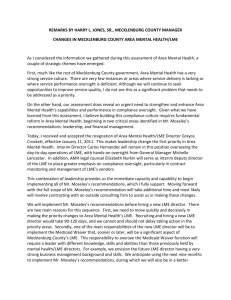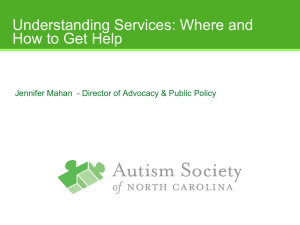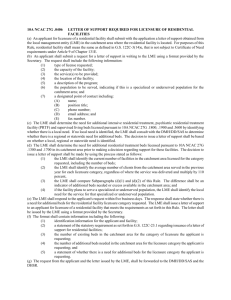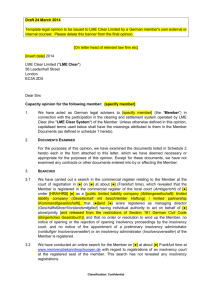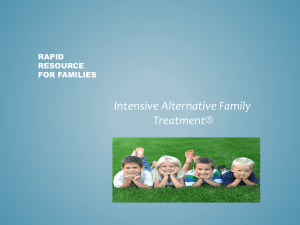Audit Objectives - North Carolina State Treasurer
advertisement
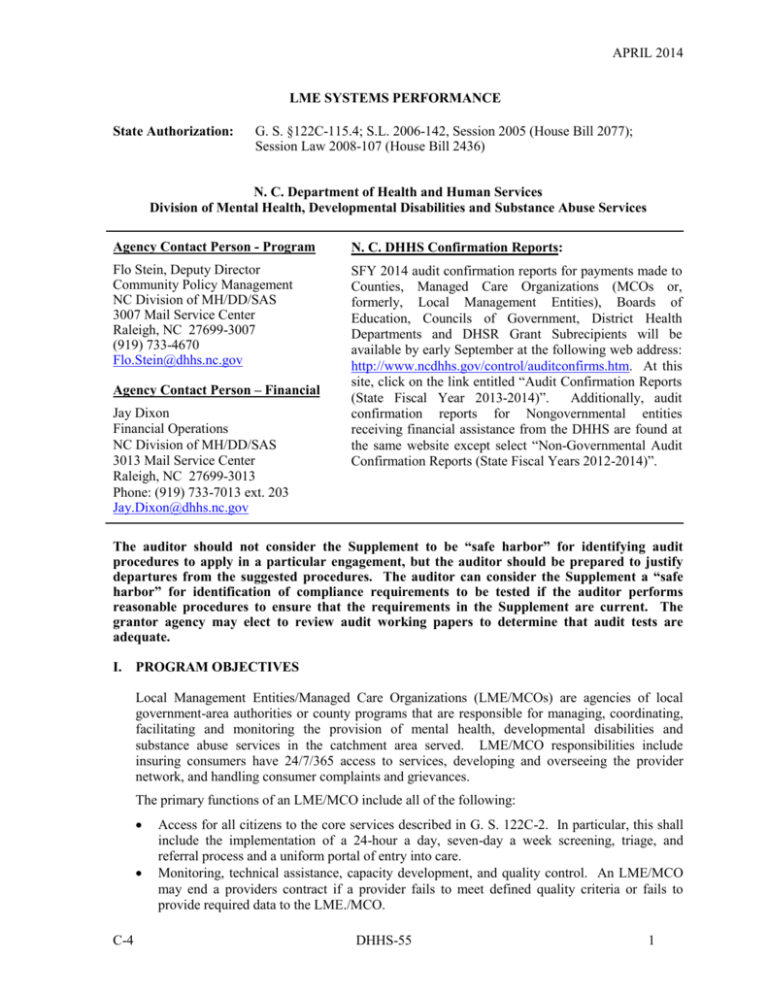
APRIL 2014 LME SYSTEMS PERFORMANCE State Authorization: G. S. §122C-115.4; S.L. 2006-142, Session 2005 (House Bill 2077); Session Law 2008-107 (House Bill 2436) N. C. Department of Health and Human Services Division of Mental Health, Developmental Disabilities and Substance Abuse Services Agency Contact Person - Program N. C. DHHS Confirmation Reports: Flo Stein, Deputy Director Community Policy Management NC Division of MH/DD/SAS 3007 Mail Service Center Raleigh, NC 27699-3007 (919) 733-4670 Flo.Stein@dhhs.nc.gov SFY 2014 audit confirmation reports for payments made to Counties, Managed Care Organizations (MCOs or, formerly, Local Management Entities), Boards of Education, Councils of Government, District Health Departments and DHSR Grant Subrecipients will be available by early September at the following web address: http://www.ncdhhs.gov/control/auditconfirms.htm. At this site, click on the link entitled “Audit Confirmation Reports (State Fiscal Year 2013-2014)”. Additionally, audit confirmation reports for Nongovernmental entities receiving financial assistance from the DHHS are found at the same website except select “Non-Governmental Audit Confirmation Reports (State Fiscal Years 2012-2014)”. Agency Contact Person – Financial Jay Dixon Financial Operations NC Division of MH/DD/SAS 3013 Mail Service Center Raleigh, NC 27699-3013 Phone: (919) 733-7013 ext. 203 Jay.Dixon@dhhs.nc.gov The auditor should not consider the Supplement to be “safe harbor” for identifying audit procedures to apply in a particular engagement, but the auditor should be prepared to justify departures from the suggested procedures. The auditor can consider the Supplement a “safe harbor” for identification of compliance requirements to be tested if the auditor performs reasonable procedures to ensure that the requirements in the Supplement are current. The grantor agency may elect to review audit working papers to determine that audit tests are adequate. I. PROGRAM OBJECTIVES Local Management Entities/Managed Care Organizations (LME/MCOs) are agencies of local government-area authorities or county programs that are responsible for managing, coordinating, facilitating and monitoring the provision of mental health, developmental disabilities and substance abuse services in the catchment area served. LME/MCO responsibilities include insuring consumers have 24/7/365 access to services, developing and overseeing the provider network, and handling consumer complaints and grievances. The primary functions of an LME/MCO include all of the following: C-4 Access for all citizens to the core services described in G. S. 122C-2. In particular, this shall include the implementation of a 24-hour a day, seven-day a week screening, triage, and referral process and a uniform portal of entry into care. Monitoring, technical assistance, capacity development, and quality control. An LME/MCO may end a providers contract if a provider fails to meet defined quality criteria or fails to provide required data to the LME./MCO. DHHS-55 1 LME SYSTEMS PERFORMANCE Utilization management, utilization review, and determination of the appropriate level and intensity of services including the review and approval of the person centered plans for consumers who receive State-funded services. Concurrent review of person centered plans for all consumers in the LME/MCO’s catchment area who receive Medicaid funded services. Authorization of the utilization of State psychiatric hospitals and other State facilities. Authorization of eligibility determination requests for recipients under a CAP-MR/DD waiver, and/or innovations waiver. Care coordination and quality management. This function includes the direct monitoring of the effectiveness of person-centered plans. It also includes the initiation of and participation in the development of required modifications to the plans for high-risk and high-cost consumers in order to achieve better client outcomes or equivalent outcomes in a more cost-effective manner. Monitoring effectiveness includes reviewing client outcomes data supplied by the provider, direct contact with consumers, review of consumer charts, reporting of required information on individuals served, service encounters, and performance measures to the Division and analysis of data to identify service gaps and plan system improvements. Community collaboration and consumer affairs including a process to protect consumer rights, an appeals process, and support of an effective consumer and family advisory committee. Financial management and accountability for the use of State and local funds and information management for the delivery of publicly funded services. The following are the 11 LME/MCOs and the counties served: LME Smoky Mountain Center Western Highlands Network (under a Management Agreement with Smoky until they officially merge on July 1, 2014) Cardinal Innovations Healthcare Solutions East Carolina Behavioral Health (ECBH) Sandhills Center for MH/DD/SAS Partners Behavioral Health Management (PBH) Eastpointe CoastalCare Alliance Bahavioral Healthcare Centerpoint Human Services MeckLink C-4 Counties Alexander, Alleghany, Ashe, Avery, Caldwell, Cherokee, Clay, Graham, Haywood, Jackson, Macon, McDowell, Swain, Watauga, Wilkes. Buncombe, Henderson, Madison, Mitchell, Polk, Rutherford, Transylvania, Yancey Alamance, Cabarrus, Caswell, Chatham, Davidson, Franklin, Granville, Halifax, Orange, Person, Rowan, Stanly, Union, Vance, Warren Beaufort, Bertie, Camden, Chowan, Craven, Currituck, Dare, Gates, Hertford, Hyde, Jones, Martin, Northampton, Pamlico, Pasquotank, Perquimans, Pitt, Tyrrell, Washington Anson, Guilford, Harnett, Hoke, Lee, Montgomery, Moore, Randolph, Richmond Burke, Catawba, Cleveland, Gaston, Iredell, Lincoln, Surry, Yadkin Bladen, Columbus, Duplin, Edgecombe, Greene, Lenoir, Nash, Robeson, Sampson, Scotland, Wayne, Wilson Brunswick, Carteret, New Hanover, Onslow, Pender Cumberland, Durham, Johnston, Wake Davie, Forsyth, Rockingham, Stokes Mecklenburg DHHS-55 2 LME SYSTEMS PERFORMANCE II. PROGRAM PROCEDURES The Division, along with the LME/MCO’s, established an annual LME/MCO system management allocation to assist the LME/MCO in carrying out the administrative functions associated with its role as a Local Management Entity/Managed Care Organization (LME/MCO) for MH/DD/SA services. Based on the LME/MCO system management allocation, payments will be disbursed on a monthly 1/12th basis during the year. The allowable administrative functions include: implementation of the local business plan/LME/MCO contract; access screening, triage, and referral; provider relations and support; customer services and consumer rights; quality management and outcomes evaluation; business management and accounting (including claims adjudication); and various information management, analysis and reporting functions. Other service system management responsibilities include discharge planning and aftercare planning with the State facilities, compliance with Diversion Law NCGS §122C-261(f), community capacity expansion, and managing bed day allocations to the State facilities. Information reported on the supplemental salary schedule is limited to positions (employees or contractors), other than Doctors of Medicine and Doctors of Osteopathic Medicine, paid above the salary for Level I on the Executive Schedule. These schedules can be accessed at http://www.opm.gov/oca/10tables/html/ex.asp and http://www.opm.gov/oca/11tables/html/ex.asp. The salary levels within these tables change each January, therefore, when measuring compliance it will be necessary to review salary tables effective January 2011 and January 2012. This form is to be completed every month by each LME/MCO to either report the required information or indicated “none” if there is no such cost to report. LME/MCO Systems Management funds shall be paid, reported and settled per rule 10A NCAC 27A.0400. III. COMPLIANCE REQUIREMENTS Crosscutting Requirements The DHHS/Division of Mental Health, Developmental Disabilities and Substance Abuse Services (DMH/DD/SAS) mandates that all the testing included within the crosscutting section be performed by the local auditors. Please refer to that section, which is identified as “DMH-0” for those mandated requirements. 1. ACTIVITIES ALLOWED OR UNALLOWED Compliance Requirement LME/MCO responsibilities include ensuring consumers have 24/7/365 access to services, developing the provider network and monitoring providers, and handling consumer complaints and grievances. Audit Objectives a. Determine whether funds were expended only for allowable activities. Suggested Audit Procedures a. Review contract requirements and determine activities which are allowable for reimbursement. b. Sample monthly billings to the DMH/DD/SAS to verify that the activities billed for relate directly to the allowable activities to be reimbursed under the terms of the Contract. 2. ALLOWABLE COSTS/COST PRINCIPLES Compliance Requirement C-4 DHHS-55 3 LME SYSTEMS PERFORMANCE All grantees that expend State funds (including federal funds passed through the N. C. Department of Health and Human Services) are required to comply with the cost principles described in the N. C. Administrative Code at 09 NCAC 03M.0201. Audit Objectives Determine whether funds allocated to the LME/MCO for LME/MCO Systems Management activities were expended for allowable costs and in accordance with the applicable cost principles. Suggested Audit Procedures a. Review contract requirements and determine activities which are allowable for reimbursement. b. Sample monthly billings to the DMH/DD/SAS to verify that the activities billed for relate directly to the allowable activities to be reimbursed under the terms of the Contract. 3. CASH MANAGEMENT This requirement does not apply at the local level. 4. CONFLICT OF INTEREST AND CERTIFICATION OF NO OVERDUE TAX DEBTS Compliance Requirement All units of local government that receive, use or expend State funds must comply with the state conflict of interest statute G. S. §14-234. In addition, all recipients are subject to federal procurement standards requiring written conflict of interest policies (OMB Circular A-102 for local governments). Audit Objectives a. Determine whether the entity has adequate policies and procedures regarding the disclosure of possible conflicts of interest. Suggested Audit Procedures a. Ascertain that the grantee has a conflict of interest policy. b. Verify through Board minutes that the policy was adopted before the grantee received and disbursed State funds. 5. ELIGIBILITY Compliance Requirement The program provides funding to the LME/MCOs for the purpose of providing administrative support to carry out and operate all of the Division’s programs of financial assistance. LME/MCOs are considered “local government” as defined in NCGS §159 and therefore must be in good standing with both the Office of State Treasurer/Local Government Commission (LGC) and the DHHS/DMH/DD/SAS. Audit Objectives a. Determine whether required eligibility determinations were made, (including obtaining any required documentation/verifications), that individual program participants or groups of participants (including area of service delivery) were determined to be eligible, and that only eligible individuals or groups of individuals (including area of service delivery) participated in the program. b. Determine whether subawards were made only to eligible subrecipients. c. Determine whether amounts provided to or on behalf of eligibles were calculated in accordance with program requirements. C-4 DHHS-55 4 LME SYSTEMS PERFORMANCE Suggested Audit Procedures a. Select a sample of client records for individuals served under the terms of the Contract; b. Review client records for documentation that allowed services were provided to individuals with any age/disability. 6. EQUIPMENT AND REAL PROPERTY MANAGEMENT Compliance Requirement Equipment Management This requirement refers to tangible property that has a useful life of more than one year and costs $5,000 or more. Such equipment may only be purchased per the conditions of the approved contract or grant agreement. If the contract should be terminated, any equipment purchased under this program shall be returned to the Division. Real Property Management This requirement does not apply to DMH/DD/SAS programs. Audit Objectives a. Determine whether the entity maintains proper records for equipment and adequately safeguards and maintains equipment. b. Determine whether disposition or encumbrance of any equipment or real property acquired under State awards is in accordance with State requirements and that the awarding agency was compensated for its share of any property sold. Suggested Audit Procedures a. Obtain entity’s policies and procedures for equipment management and ascertain if they comply with the State’s policies and procedures. b. Select a sample of equipment transactions and test for compliance with the State’s policies and procedures for management and disposition of equipment. 7. MATCHING, LEVEL OF EFFORT, EARMARKING This requirement does not apply at the local level. 8. PERIOD OF AVAILABILITY OF STATE FUNDS This requirement does not apply to this program. 9. PROCUREMENT AND SUSPENSION AND DEBARMENT This requirement does not apply to this program. 10. PROGRAM INCOME This requirement does not apply at the local level. 11. REAL PROPERTY ACQUISITION AND RELOCATION ASSISTANCE This requirement does not apply to DMH/DD/SAS programs. 12. REPORTING Compliance Requirement LME/MCO Performance Contract Reports/Data requirements are published annually at http://www.ncdhhs.gov/mhddsas/statspublications/Contracts/index.htm#requirements. They include, but are not limited to: C-4 DHHS-55 5 LME SYSTEMS PERFORMANCE Access to Care / Call Center Reports: to be submitted quarterly, due on the 20th of the month following the end of the quarter: 10/20; 1/20; 4/20; 7/20; Monthly Monitoring Report: to be submitted monthly, due on the 20th of each month; Monthly Financial Report: to be submitted monthly, due on the 20th of each month; Substance Abuse/Juvenile Justice Initiative Quarterly Report: to be submitted quarterly, due on the 20th of the month following the end of the quarter: 10/20; 1/20; 4/20; 7/20; Work First Initiative Quarterly Reports: to be submitted quarterly, due on the 20th of the month following the end of the quarter: 10/20; 1/20; 4/20; 7/20; Client Data Warehouse (CDW) Records: to be submitted monthly, due on the 15th of each month. NC Treatment Outcomes and Program Performance System (NC-TOPPS): Initial, Update, and Episode Completion Interviews; (LME/MCO is responsible for ensuring that contracted providers submit the reports). Compliance reports are produced quarterly. National Core Indicators (NCI): Consent forms, pre-survey and family addresses are to be submitted annually on DMH/DD/SAS schedule. NC Support Needs Assessment Profile (NC-SNAP): (LME/MCO is responsible for ensuring that contracted providers submit the reports); Compliance reports are produced quarterly. MH/SA Consumer Perception of Care Survey: to be collected annually in collaboration with DMH/DD/SAS. System of Care Report: to be submitted semi-annually, due on January 20th & July 20th. Mobile Crisis and Walk-in Services Reports: to be submitted semi-annually. Reports for the period of July 1 - December 31 are due on February 15th; Reports for January 1 - June 30 are due on August 15th; TBI Quarterly Reports: to be submitted due on the 15th of the month following the end of the quarter: 10/31; 1/31; 4/30; 7/31. Three Way Contract Hospital Bed Reports: to be submitted monthly by the 20th of the month (LME is responsible for ensuring that contracted hospitals submit the reports); NC Start and Crisis Respite Report: to be submitted quarterly. Geriatric Adult Mental Health Specialty Team Quarterly Report: to be submitted by the six AST providers quarterly (LME/MCO is responsible for ensuring that contracted providers submit the reports). Path Quarterly Report: to be submitted by the six AST providers quarterly. LME Housing Annual Report: to be submitted by the LME/MCOs annually. Housing Activities/Accomplishments: to be submitted by LME/MCOs quarterly. LME Complaint Report: to be submitted five months after the quarter in which data is collected, due on 2/20, 5/20, 8/20, 11/20. Audit Objectives a. Determine whether required reports include all activities of the reporting period, are supported by applicable accounting or performance records, and are fairly presented in accordance with program requirements. Suggested Audit Procedures a. Review applicable laws, regulations and the provisions of the contract for reporting requirements. b. Verify that Contractor has provided all required reports. c. Ascertain if the financial reports were prepared in accordance with the required accounting basis. C-4 DHHS-55 6 LME SYSTEMS PERFORMANCE d. For Performance and Program reports, verify that the data were accumulated and summarized in accordance with the required or stated criteria and methodology, including the accuracy and completeness of the reports. e. Ensure that reports which are reviewed are copies of the same reports submitted to DHHS by the LME/MCO. 13. SUBRECIPIENT MONITORING Compliance Requirement Monitoring is required if the agency disburses or transfers any State funds to other organizations, except for the purchase of goods or services, the grantee shall require such organizations to file with it similar reports and statements as required by G. S. §143C-6-22 and 6-23 and the applicable prescribed requirements of the Office of the State Auditor’s Audit Advisory #2 (as revised January 2004) including its attachments. If the agency disburses or transfers any pass-through federal funds received from the State to other organizations, the agency shall require such organizations to comply with the applicable requirements of OMB Circular A-133. Accordingly, the agency is responsible for monitoring programmatic and fiscal compliance of subcontractors based on the guidance provided in this compliance supplement and the audit procedures outlined in the DMH-0 Cross-cutting Supplement. Audit Objectives a. Determine whether the pass-through entity properly identified State award information and compliance requirements to the sub-recipient, and approved only allowable activities in the award documents. b. Determine whether the pass-through entity monitored sub recipient activities to provide reasonable assurance that the sub-recipient administers State awards in compliance with State requirements. c. Determine whether the pass-through entity ensured required audits are performed, issued a management decision on audit findings within 6 months after receipt of the sub-recipient’s audit report, and ensures that the sub-recipient takes timely and appropriate corrective action on all audit findings. d. Determine whether in cases of continued inability or unwillingness of a sub-recipient to have the required audits, the pass-through entity took appropriate action using sanctions. e. Determine whether the pass-through entity evaluates the impact of sub-recipient activities on the pass-through entity. Suggested Audit Procedures a. Gain an understanding of the pass-through entity’s sub-recipient procedures through a review of the pass-through entity’s sub-recipient monitoring policies and procedures (e.g., annual monitoring plan) and discussions with staff. This should include an understanding of the scope, frequency, and timeliness of monitoring activities and the number, size, and complexity of awards to sub-recipients. b. Review the pass-through entity’s documentation of during-the-award monitoring to ascertain if the pass-through entity’s monitoring provided reasonable assurance that subrecipients used State awards for authorized purposes, complied with laws, regulations, and the provisions of contracts and grant agreements, and achieved performance goals. c. Review the pass-through entity’s follow-up to ensure corrective action on deficiencies noted in during-the-award monitoring. d. Verify that in cases of continued inability or unwillingness of a sub-recipient to have the required audits, the pass-through entity took appropriate action using sanctions. e. Verify that the effects of subrecipient noncompliance are properly reflected in the passthrough entity’s records. C-4 DHHS-55 7 LME SYSTEMS PERFORMANCE 14. SPECIAL TESTS AND PROVISIONS Compliance Requirement All grantees are required to comply with the N. C. Department of Health and Human Services and the Division of Mental Health, Developmental Disabilities and Substance Abuse Services records retention schedules and policies. Financial records shall be maintained in accordance with established federal and State guidelines. The records of the grantee shall be accessible for review by the staff of the North Carolina Department of Health and Human Services and the Office of the State Auditor for the purpose of monitoring services rendered, financial audits by third party payers, cost finding, and research and evaluation. Records shall be retained for a period of three years following the submission of the final Financial Status Report or three years following the submission of a revised final Financial Status Report. Also, if any litigation, claim, negotiation, audit, disallowance action, or other action involving these funds has been started before expiration of the three year retention period, the records must be retained until the completion of the action and resolution of all issues which arise from it, or until the end of the regular three year period, whichever is later. The grantee shall not destroy, purge or dispose of records related to these funds without the express written consent of N. C. DHHS/DMH/DD/SAS. The agency must comply with any additional requirements specified in the contract or to any other performance-based measures or agreements made subsequent to the initiation of the contract including but not limited to findings requiring a plan of correction or remediation in order to bring the program into compliance. Audit Objectives a. To ensure compliance with the NCDHHS and DMH/DD/SAS records retention schedules and policies. b. To ensure compliance with all federal and State policies, laws and rules that pertain to this fund source and/or to the contract/grant agreement. Suggested Audit Procedures a. Verify that records related to this fund source are in compliance with N. C. DHHSDMH/DD/SAS record retention schedules and policies. b. Review contract/grant agreement, identify any special requirements; and c. Verify if the requirements were met. C-4 DHHS-55 8
